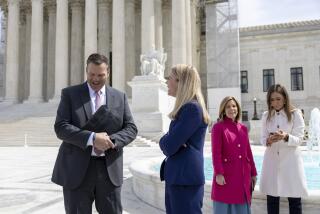Ruling Seen as Precursor to Same-Sex Marriages
- Share via
WASHINGTON — The Supreme Court’s decision upholding gay civil rights leads logically -- and some say, inevitably -- to same-sex marriages in the United States, say both gay rights supporters and advocates of traditional family structures.
The two sides in this “culture war” find themselves in agreement on what Thursday’s decision means.
By a 6-3 vote, the court struck down laws criminalizing sex between gays and described their relationships as a “personal bond” that is protected by the Constitution.
If so, some of these people say, it is only a small step further to say that gays who establish such personal bonds should be permitted to marry, just like heterosexual couples.
“If you extend the logic and the reasoning of that decision, that’s where we are headed,” says Richard Lessner of the Family Research Council. “We’re convinced this case was brought to provide the foundation for same-sex marriages. [Gay-rights advocates] were looking for a precedent, and now they have it.”
The lawyers who brought the Texas case before the high court agree it leads logically to recognition of same-sex marriages.
“I think it is inevitable now. In what time frame, we don’t know,” said Patricia Logue, a lawyer for Lambda Legal Defense and Education Fund in New York and co-counsel in the Lawrence vs. Texas case decided Thursday. “It’s happening in Canada and in Europe, and the Lawrence decision obviously helps here. Most of anti-gay discrimination comes down to, ‘We don’t approve of you, and we don’t like you.’ But the court has [held] that is not an acceptable reason for discrimination.”
State courts in Massachusetts and New Jersey are considering cases brought by gay couples seeking the right to marry. If they win in one state, lawyers for gay civil rights hope to set a precedent that will eventually allow for same-sex marriages nationwide.
“It’s not going to happen this year or next, but in the next decade, I think it’s likely,” said Georgetown University law professor Chai Feldblum, who teaches gay rights law. “The state lawyers [in the pending cases] have a hard time proving that [allowing gays to marry] will harm the institution of marriage.”
In one way, the Supreme Court went out of its way to make clear it was not giving gays a right to marry under state law. In his majority opinion, Justice Anthony M. Kennedy said the Texas case “does not involve whether the government must give formal recognition to any relationship homosexual persons seek to enter.” In her concurring opinion, Justice Sandra Day O’Connor added that the “traditional institution of marriage” is not at issue.
But other parts of the court’s opinion stressed the “moral disapproval” of gays did not justify a state’s discrimination against them.
The justices “are not ready to open up marriage to gay people. They think the public isn’t quite ready for it,” said Feldblum, a former clerk at the court. “But as a matter of logic and principle, there is no reason not to provide the institution of marriage for gay people. The court is leaving that open for the future.”
Lessner, whose group has been pressing for state laws that say marriage is reserved for a man and a woman, believes the court’s decision poses a major threat. “We find ourselves strangely in agreement with the people on the gay rights side,” he said.
In 1996, Congress passed the Defense of Marriage Act to try to block a state-by-state drive toward same-sex marriages.
Proponents of that law feared that state courts in Hawaii or Vermont would accord gays and lesbians a right to marry. And after marrying there, gay couples could seek recognition of their legal unions in other states under the “full faith and credit” clause of the Constitution. This provision requires courts in one state to honor legal agreements made in another state.
Although the Defense of Marriage Act creates one barrier to same-sex marriages, opponents say it would not prevent the Supreme Court from striking down as unconstitutional all the state laws excluding same-sex marriage.
More to Read
Sign up for Essential California
The most important California stories and recommendations in your inbox every morning.
You may occasionally receive promotional content from the Los Angeles Times.














